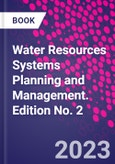Water Resources Systems Planning and Management, Second Edition, Volume 51 presents new and updated material, including case studies, examples and important updates on topics such as climate change and integrated water resources management. Authored by two renowned experts in the field of water resources, this text provides an overview of the current status of water resources utilization, the likely scenario of future demands, simulation and techniques of economic analysis, concepts of planning, the planning process, integrated planning, public involvement, reservoir sizing, and finally, systems operation and management.
This book presents a comprehensive overview of the field that is relevant for students, professors, scholars, researchers, and consultants in the fields of Water Resources, Civil Engineering, Environmental Engineering and Hydrology.
Please Note: This is an On Demand product, delivery may take up to 11 working days after payment has been received.
Table of Contents
PART I Preliminaries
1 Introduction to Water Resources Systems
2 Acquisition and Processing of Water Resources Data
3 Advanced Techniques for Data Acquisition and Systems Modeling
4 Statistical Techniques for Data Analysis
PART II Decision making
5 Systems Analysis Techniques
6 Economic Considerations in Water Resources Management
7 Environmental and Social Considerations
8 Rational Decision Making
PART III Water resources planning and development
9 Water Resources Planning
10 Reservoir Sizing
PART IV Systems operation and management
11 Reservoir Operation
12 Reservoir Sedimentation
13 Water Quality Modeling
14 Climate Change and Its Impacts on Water Resources
15 River Basin Planning and Management
Authors
Sharad K. Jain Former Director, National Institute of Hydrology, Roorkee, Uttaranchal, India. Visiting Professor, Civil Engineering Department, IIT Roorkee, India..Dr. Sharad Jain is Visiting Professor, Civil Engineering Department, IIT Roorkee, India. He was the Director, National Institute of Hydrology, Roorkee, India, during 2017-20. He was a Post-Doctoral fellow in Japan and Visiting Professor at the Louisiana State University, USA, for one year. During Apr. 2009 - Apr. 2012, he was NEEPCO Chair Professor at IIT Roorkee. He is also Adjunct Professor, Department of Civil Engineering, IIT Madras, Chennai. His research interests include Surface Water Hydrology, Water Resources Planning and Management, Impact of Climate Change, Application of Advanced Tools such as Artificial Neural Networks and Remote Sensing & GIS, and water governance.
Dr. Jain has co-authored five books and has edited five books, wrote 25 book-chapters, nine articles in Encyclopedias, and more than 290 papers. He has organized > 30 short-term courses and worked on > 30 research and consultancy projects. Dr Jain has developed a web-based course under NPTEL (E-learning program of IITs). His group has developed a software package to perform a range of analyses related with sizing, flood routing, yield estimation, and operation of a system of reservoirs that may be encompassing multiple basins. The group led by Dr Jain has carried out many modeling studies and has set up an instrumented experimental catchment on Henval river in the Upper Ganga Basin.
Dr. Jain is a member of editorial board of many journals and Chairman/ member of many technical committees.
V.P. Singh Professor, Department of Civil and Environmental Engineering, Louisiana State University, Baton Rouge, LA, USA, Professor of Water Engineering at Texas A and M University, Texas, USA. V.P. Singh is a Professor of Water Engineering at Texas A and M University. Over his career he has won numerous awards including the Engineering Medal of Achievement (University of Guelph, Guelph, Canada, 2017) and the Ven Te Chow lecture and Award (International Water Resources Association, 2017). He has published numerous books and journal articles and his research focuses on surface-water Hydrology, Groundwater Hydrology, Hydraulics, Irrigation Engineering, Environmental Quality and Water Resources. Principal research topics have encompassed: 1. Watershed modeling, 2. Erosion and Sediment Transport in Upland Watersheds, 3. Streamflow Forecasting, 4. Dam Break Analysis, 5. Entropy-Based Modeling, 6. Network Design, 7. Groundwater Modeling, and 8. Hydrologic Impacts of Climate Change.







